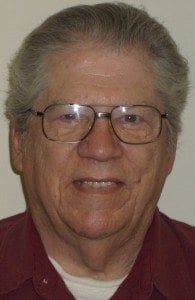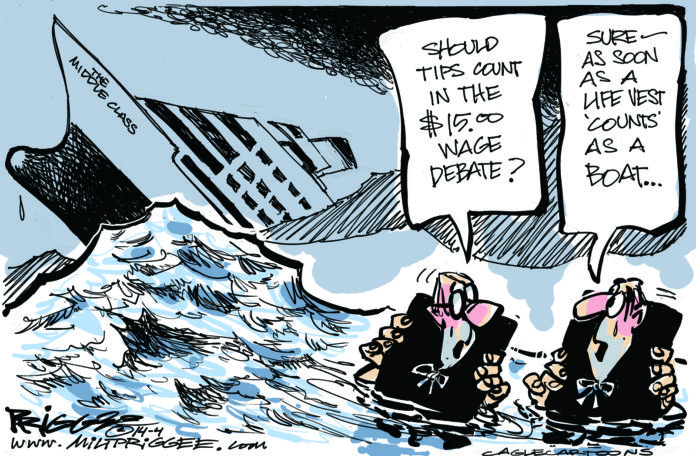BY KENNETH WELLS
 Growing inequality of wealth and social well-being, prevalent in today’s United States, was started during the first term of President Ronald Reagan.
Growing inequality of wealth and social well-being, prevalent in today’s United States, was started during the first term of President Ronald Reagan.
Reagan’s dismantling of the Federal Aviation Administration Employees Union promoted a rallying anti-union cry, not seen since the 1920s.
Unfortunately, the word “union” began to be utilized offensively in the 1960s and into the ‘70s as troubles developed in the steel and longshoremen unions due to lack of active membership participation. Again today, the entire argument against organized labor is fraught with innuendos, half-truths and suppositions.
The loudest challengers against organized labor basically know not of what they speak. Their rallying point is that union dues are “forced upon” individuals who do not want to have their moneys used for political advertisements.
Employees’ union dues are largely allocated to employee pension plans, to administer the nationwide membership organizations and for expenses incurred in negotiations for safer working conditions and better wages. Support of a political ad or candidate is democratically determined by a vote of the active membership, not arbitrarily expended from union dues.
The growth of the middle-class after the Great Depression of the 1930s was the result of the expansion of labor unions across America’s workforce combined with President Roosevelt’s “New Deal.”
Both of these actions occurred despite wide opposition from the Republican Party which still continues today.
A robust society requires a large, prosperous middle-class with progressive ideas.
Lawrence H. Summers, President Emeritus of Harvard University, and Ed Balls, Labor and Co-operative member of England’s Parliament, both aptly described it, “Today, the ability of free-market democracies to deliver widely shared increases in prosperity is in question as never before. The primary challenge democracies face is neither military nor philosophical. Rather, for the first time since the Great Depression, many industrial democracies are failing to raise living standards and provide opportunities for social mobility to a large share of their people.”
They further explained, “It has always been the mission of progressives to ensure rising prosperity and opportunity. A strong, inclusive economy is the platform for a socially mobile, optimistic, and successful society. While the economic mission of progressives is unchanging, the means of its achievement change from generation to generation as economy evolves. Today, we are living in the age of globalization and technological revolutions. Both have delivered much benefit to society, but have reshaped the political economy of Western industrialized countries in ways that challenge the middle-class and those striving to get into it. Democracy must serve the common good, the cause of social justice and the aspirations of parents for their children. For democracies to thrive, rising prosperity must be within reach of all our citizens.”
Economic Policy Institute senior economist Elise Gould’s analysis of wage stagnation showed 2014 continuing a 35-years trend of broad-based wage stagnation. Workers with postgraduate degrees, realizing the lowest rate of unemployment, are also seeing their wages decline.
Those who oppose establishing a livable hourly amount as a national minimum wage are fighting this not only at the federal level but also state levels.
A recent move by larger retail outlets and some large companies to voluntarily raise their entry-level employee wages is encouraging. This action was brought about in large part by extensive networking of the workforce who, in turn, are using social media to bring pressure on both public and family-owned corporations.
Could this be the answer to quell today’s misinterpreted animosity toward organized labor?
At the beginning of 2014, 14 states had already established state minimum wages higher than the federal minimum of $7.25. During that same year, legislators in 11 states raised minimum wages, and in four more states the voters decided to raise the minimum wage. Five Oklahoma Native American tribes have raised their minimum hourly wage. [source: David Blatt, executive director, Oklahoma Policy Institute]
Perhaps the time is at hand when workers must again form negotiating bodies and work toward common agreement between employers and employees. Perhaps the sustaining foundation of our democracy – the middle-class – may again find opportunities in which our social prosperity may rise from its downward spiral to provide futures for their progeny which only the working middle-class can provide!
It is time for Oklahoma’s Legislature to “wake up and do something good.”
– Kenneth Wells lives in Ratliff City, OK, and is an occasional contributor to The Oklahoma Observer. His essays appear in newspapers across southwestern Oklahoma.







